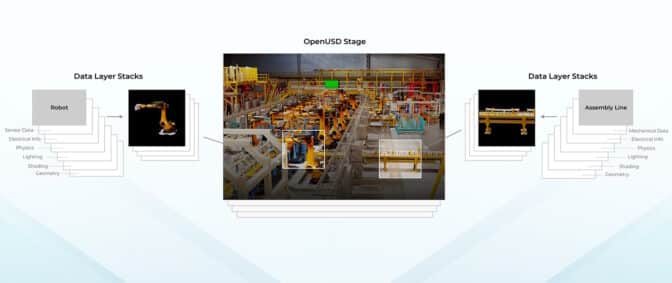NVIDIA joined Pixar, Adobe, Apple and Autodesk today to found the Alliance for OpenUSD, a major leap toward unlocking the next era of 3D graphics, design and simulation.
The group will standardize and extend OpenUSD, the open-source Universal Scene Description framework that’s the foundation of interoperable 3D applications and projects ranging from visual effects to industrial digital twins.
Several leading companies in the 3D ecosystem already signed on as the alliance’s first general members — Cesium, Epic Games, Foundry, Hexagon, IKEA, SideFX and Unity.
Standardizing OpenUSD will accelerate its adoption, creating a foundational technology that will help today’s 2D internet evolve into a 3D web. Many companies are already working with NVIDIA to pioneer this future.
From Skyscrapers to Sports Cars
OpenUSD is the foundation of NVIDIA Omniverse, a development platform for connecting and building 3D tools and applications. Omniverse is helping companies like Heavy.AI, Kroger and Siemens build and test physically accurate simulations of factories, retail locations, skyscrapers, sports cars and more.
For IKEA, OpenUSD represents “a nonproprietary standard format to author and store 3D content to connect our value chain even closer, and develop home furnishing solutions to a lower price,” Martin Enthed, an innovation manager at IKEA, said in a press release the alliance issued today.
“By joining the alliance, we’re demonstrating our dedication to the advantages that OpenUSD provides our clients when linking with cloud-based platforms, including Nexus, Hexagon’s manufacturing platform, HxDR, Hexagon’s digital reality platform, and NVIDIA Omniverse to build innovative solutions in their industries,” said Burkhard Boeckem, CTO of Hexagon.
The Origins of OpenUSD
Pixar started work on USD in 2012 as a 3D foundation for its feature films, offering interoperability across data and workflows. The company made this powerful, multifaceted technology open source four years later, so anyone can use OpenUSD and contribute to its development.

OpenUSD supports the requirements of building virtual worlds — like geometry, cameras, lights and materials. It also includes features necessary for scaling to large, complex datasets, and it’s tremendously extensible, enabling the technology to be adapted to workflows beyond visual effects.

One unique capability of OpenUSD is its layering system, which lets users collaborate in real time without stepping on each other’s toes. For example, one artist can model a scene while others create the lighting for it.
Forging a Shared Standard
As its first priority, the alliance will develop a specification that describes the core functionality of OpenUSD. That’ll provide a recipe tool builders can implement, encouraging adoption of the open standard across the widest possible array of use cases.
The alliance will operate as part of the Joint Development Foundation (JDF), a branch of the Linux Foundation. The JDF provides a path to turn written specifications into industry standards suitable for adoption by globally respected groups like the International Organization for Standardization, or the ISO.
From OpenUSD to Omniverse
NVIDIA has a deep commitment to OpenUSD and working with ecosystem partners to accelerate the framework’s evolution and adoption across industries.
At last year’s SIGGRAPH, NVIDIA detailed a multiyear roadmap of contributions it’s making to enable OpenUSD use in architecture, engineering, manufacturing and more. An update on these plans will be presented by NVIDIA as part of the alliance at this year’s conference on computer graphics.
Help Build the 3D Future
Collaboration is key to the alliance and evolution of OpenUSD.
To get involved or learn more, attend NVIDIA’s keynote, OpenUSD day, hands-on labs and other showfloor activities at SIGGRAPH, running Aug. 6-10.
The Alliance for OpenUSD also will host a keynote panel session at the Academy Software Foundation’s Open Source Days 2023.
For more information on the Alliance for OpenUSD (AOUSD), visit the webpage, and follow @AllianceOpenUSD on Twitter, Instagram, Facebook, and LinkedIn.
For a deeper dive on OpenUSD:
